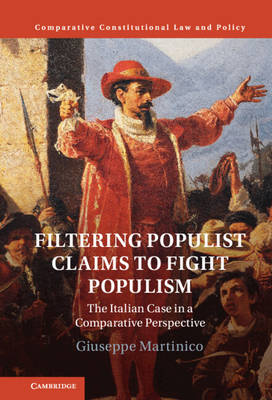
Bedankt voor het vertrouwen het afgelopen jaar! Om jou te bedanken bieden we GRATIS verzending (in België) aan op alles gedurende de hele maand januari.
- Afhalen na 1 uur in een winkel met voorraad
- In januari gratis thuislevering in België
- Ruim aanbod met 7 miljoen producten
Bedankt voor het vertrouwen het afgelopen jaar! Om jou te bedanken bieden we GRATIS verzending (in België) aan op alles gedurende de hele maand januari.
- Afhalen na 1 uur in een winkel met voorraad
- In januari gratis thuislevering in België
- Ruim aanbod met 7 miljoen producten
Zoeken
Filtering Populist Claims to Fight Populism
The Italian Case in a Comparative Perspective
Giuseppe Martinico
€ 198,95
+ 397 punten
Uitvoering
Omschrijving
The new wave of populism that has emerged over the last five years in Europe and in the US urgently needs to be better understood in a comparative and historical context. Using Italy - including the experiment of a self-styled populist coalition government - as a case study, this book investigates how populists in power borrow, use and manipulate categories of constitutional theory and instruments of constitutional law. Giuseppe Martinico goes beyond treating constitutionalism and populism as purely antithetical to dive deeply into the impact of populism on the activity of some instruments of constitutional democracy, endeavoring to explore their role as possible fora of populist claims and targets of populist attacks. Most importantly, he points to ways in which constitutional democracies can channel populist claims without jeopardizing the legacy of post-World War II constitutionalism. This book is aimed at academics and practicing lawyers interested in populism and comparative constitutional law.
Specificaties
Betrokkenen
- Auteur(s):
- Uitgeverij:
Inhoud
- Aantal bladzijden:
- 224
- Taal:
- Engels
- Reeks:
Eigenschappen
- Productcode (EAN):
- 9781108496131
- Verschijningsdatum:
- 25/11/2021
- Uitvoering:
- Hardcover
- Formaat:
- Genaaid
- Afmetingen:
- 152 mm x 229 mm
- Gewicht:
- 467 g

Alleen bij Standaard Boekhandel
+ 397 punten op je klantenkaart van Standaard Boekhandel
Beoordelingen
We publiceren alleen reviews die voldoen aan de voorwaarden voor reviews. Bekijk onze voorwaarden voor reviews.









